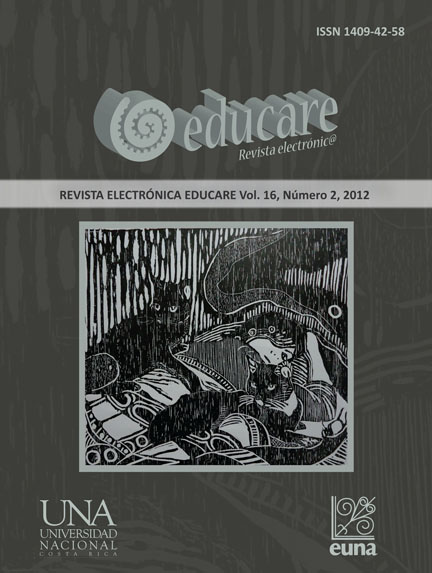Conversation Circles as a Teaching Strategy: An Experience to Reflect on and Implement in Higher Education
DOI:
https://doi.org/10.15359/ree.16-2.1Keywords:
Teaching strategy, conversation circle, experience, higher education.Abstract
The experience approached in this paper aims at reflecting, reasoning, planning and implementing the “Conversation Circles” as a teaching strategy in the PF-4237 course “Theory of Education: Multiculturalism and Education” of the Latin American Doctoral Program in Education, University of Costa Rica. This training experience, based on the communicative action theory, intended to integrate the assistance of the teacher, the confrontation to otherness and the building of knowledge, skills and social attitudes in higher education.
References
Arbelo, R. (2009). Llegaremos a tiempo. En álbum A las buenas y a las malas. [CD]. Los Angeles:
Warner music.
Bernal, F. y Castillo, S. (2006). Justicia restaurativa en Costa Rica.: Acercamientos teóricos y prácticos.
San José, Costa Rica: CONAMAJ.
Caldwell, E. (2011). Diario de reflexión. La experiencia de ser sujeto social y vivir la intersubjetividad: El
círculo de conversación como estrategia para el aprendizaje. Universidad de Costa Rica.
Cavalini, H. (2011). Diario de reflexión. Nosotros con los otros. Universidad de Costa Rica.
De Vita, A. (2009). La creación social. Relaciones y contextos para educar. Roma: Carocci.
Elias, N. (1990). La sociedad de los individuos. Barcelona: Península.
Gadamer, H.-G. (2004). Hermenéutica de la Modernidad. Conversaciones con Silvio Vietta. (Trad. L.
Elizaincín-Arrarás). Madrid: Minima Trotta.
García, J. (2007). Leer en la cara y en el mundo. Madrid: Herder.
León, A. (2011). Diario de reflexión. Educación: Entendimiento social y trabajo de aula. Universidad
de Costa Rica.
Martínez, J. (2008). El viaje. Manuscrito inédito.
Martínez, Z. (2010). Círculos de paz. Hacia una cultura del diálogo y la reflexión en el ambiente
laboral. Manuscrito inédito.
Pranis, K., Stuart, B. y Wedge, M. (2003). Peacemaking Circles. From Crime to Community [Haciendo
círculos de paz. Del crímen a la comunidad]. New York: Living Justice Press.
Zambrano, M. (2002). L’art de les mediacions (Textos pedagògics) [El arte de las mediaciones.
Textos pedagógicos]. Barcelona: Universidad de Barcelona.
Downloads
Published
How to Cite
Issue
Section
License
1. In case the submitted paper is accepted for publication, the author(s) FREELY, COSTLESS, EXCLUSIVELY AND FOR AN INDEFINITE TERM transfer copyrights and patrimonial rights to Universidad Nacional (UNA, Costa Rica). For more details check the Originality Statement and Copyright Transfer Agreement
2. REUTILIZATION RIGHTS: UNA authorizes authors to use, for any purpose (among them selfarchiving or autoarchiving) and to publish in the Internet in any electronic site, the paper´'s final version, both approved and published (post print), as long as it is done with a non commercial purpose, does not generate derivates without previous consentment and recognizes both publisher's name and authorship.
3. The submission and possible publication of the paper in the Educare Electronic Journal is ruled by the Journal’s editorial policies, the institutional rules of Universidad Nacional and the laws of the Republic of Costa Rica. Additionally, any possible difference of opinion or future dispute shall be settled in accordance with the mechanisms of Alternative Dispute Resolution and the Costa Rican Jurisdiction.
4. In all cases, it is understood that the opinions issued are those of the authors and do not necessarily reflect the position and opinion of Educare, CIDE or Universidad Nacional, Costa Rica. It is also understood that, in the exercise of academic freedom, the authors have carried out a rogorous scientific-academic process of research, reflection and argumentation thar lays within the thematic scope of interest of the Journal.
5. The papers published by Educare Electronic Journal use a Creative Commons License:














 The articles published by Educare Electronic Journal can be shared with a Creative Commons License:
The articles published by Educare Electronic Journal can be shared with a Creative Commons License: 



